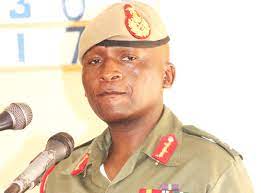Relebohile Makhetha
During his riveting testimony before Judge Maliepollo Makhetha in the High Court this week, retired Brigadier Ntlele Ntoi, former spokesperson of the Lesotho Defence Force (LDF), unraveled the spine-chilling narrative behind the tumultuous events of August 30, 2014.
On that fateful day, Lesotho was plunged into turmoil as reports of an attempted coup surfaced, allegedly orchestrated by a faction within the military, sending shockwaves through the nation’s delicate political landscape.
Adding fuel to the fire, parliament had been effectively silenced for a period, prorogued by the King upon the advice of then Prime Minister Thomas Thabane.
This move triggered a cascading political crisis, exacerbating tensions already simmering beneath the surface.
Under the leadership of Lieutenant General Tlali Kamoli, the purported coup unfolded as a military operation aimed at seizing weapons, notably assault rifles, purportedly planned to be disseminated to youthful political activists aligned with Thabane.
The ensuing chaos forced Thabane into a brief exile in South Africa, labeling the events as nothing short of an attempted coup.
Following negotiations brokered by mediator Cyril Ramaphosa, then South African deputy president, an agreement was reached to expedite the electoral process. As outlined in the Maseru facilitation declaration and the Maseru security accord, elections were slated for February 28, 2015, a full two years ahead of the originally scheduled timeframe.
Kamoli now finds himself embroiled in legal proceedings, alongside three other individuals, including former deputy prime minister and Lesotho Congress for Democracy (LCD) leader Mothetjoa Metsing, as well as Selibe Mochoboroane, the minister of health and leader of the Movement for Economic Change (MEC).
They face charges of allegedly conspiring to unlawfully overthrow the government.
Of the accused, Kamoli and Captain Litekanyo Nyakane remain in custody, while the others have been granted bail pending further legal proceedings.
During his testimony Ntoi highlighted various critical issues surrounding the political climate in Lesotho at that time.
He shed light on the strained relations within the three-party coalition government, comprising the All Basotho Convention (ABC), LCD, and the Basotho National Party (BNP).
Notably, the coalition began to fracture due to mounting tensions, leading to a call for a vote of no-confidence against Prime Minister Thabane in March 2014.
Thabane’s response to the impending vote by advising the King to prorogue parliament in June further exacerbated the situation. As dissent simmered, Metsing rallied the public to protest against Thabane’s actions, scheduling a demonstration for September 1.
Amidst these escalating tensions, allegations emerged that police officers were plotting to arm the Under The Tree Army (UTA), a radical youth group poised to confront anti-Thabane protesters.
Ntoi said in response, the military, fearing the potential for widespread chaos, took preemptive action. He revealed that military intelligence had long been monitoring the UTA, linking them to past armed conflicts dating back to 2007 and even to an attack on the state house in June 2009.
Further complicating matters, he said suspicions arose regarding collusion between certain members of the Lesotho Mounted Police Service (LMPS) and these alleged terrorist elements.
To proactively mitigate potential terrorist threats, Ntoi detailed Kamoli’s decision to dispatch a delegation, which included himself along with Major Tumo Lekhooa, Major Bulane Sechele, and Lieutenant Kennel Phaila. Their mission: to apprise Mothetjoa Metsing of the imminent danger and dissuade him from proceeding with the planned protest.
Upon arrival, they found Metsing in the company of Selibe Mochoboraone, the then minister of communications, and Tšeliso Mokhosi. Brigadier Ntoi vividly recalled the palpable tension in the room as Metsing, Mochoboraone, and Mokhosi reacted with visible alarm to the revelations.
During the meeting, the delegation implored Metsing to cancel the scheduled protests and relayed Kamoli’s strategy to disarm specific police stations suspected of arming the UTA.
Amidst the discussions, the suggestion to switch off the radios was raised, although Brigadier Ntoi could not recall the specifics. Nevertheless, he affirmed that the proposal originated from a member of the army delegation dispatched to the deputy prime minister’s office.
Summary
- Under the leadership of Lieutenant General Tlali Kamoli, the purported coup unfolded as a military operation aimed at seizing weapons, notably assault rifles, purportedly planned to be disseminated to youthful political activists aligned with Thabane.
- Notably, the coalition began to fracture due to mounting tensions, leading to a call for a vote of no-confidence against Prime Minister Thabane in March 2014.
- He revealed that military intelligence had long been monitoring the UTA, linking them to past armed conflicts dating back to 2007 and even to an attack on the state house in June 2009.

Your Trusted Source for News and Insights in Lesotho!
At Newsday Media, we are passionate about delivering accurate, timely, and engaging news and multimedia content to our diverse audience. Founded with the vision of revolutionizing the media landscape in Lesotho, we have grown into a leading hybrid media company that blends traditional journalism with innovative digital platforms.










